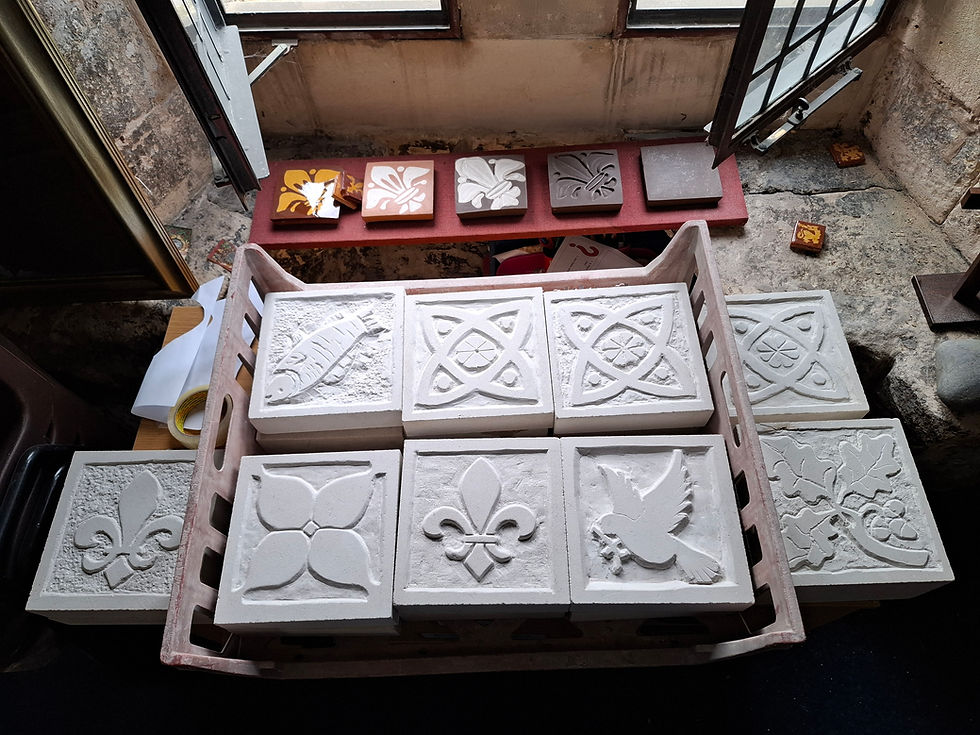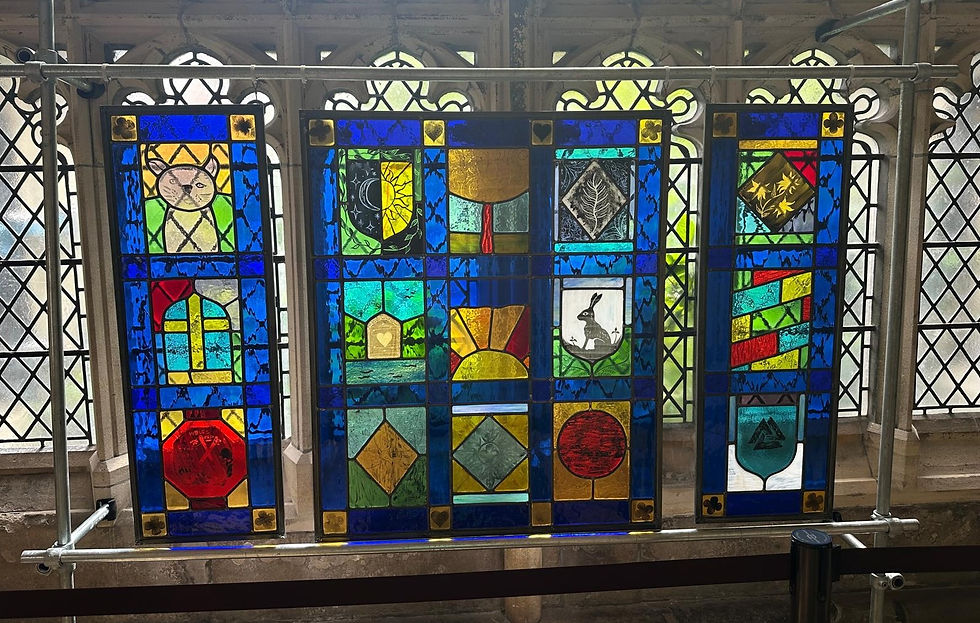How GCA artists helped to make ‘Crafts that built the Cathedral’
- John Steed

- Aug 19, 2025
- 5 min read
Updated: Aug 20, 2025
by Cathy Steed
This summer Gloucester Cathedral has a very special exhibition taking place in the Cloisters and Lady Chapel based on the theme of ‘Crafts that built the Cathedral.
It has been the dream of Lizzie Hathaway White, the Cathedral’s Learning and Participation Officer to put on a show to celebrate the ancient skills that created our beautiful Cathedral.
When Lizzie heard about Gloucester Contemporary Artists in 2024 she was delighted to discover that we have local artists in our ranks who could help her achieve her dream. Many of the heritage skills are being kept alive by artists and craftspeople such as those in our group.
Artists were asked to provide a series of workshops, some funded by the Cathedral, some in partnership with the NHS and some paid for by the participants. Work made in the workshops by members of the community and patients and staff in local hospitals would be displayed in the exhibition through the summer holidays until 7 September 2025.
It was a great opportunity for the artists involved to engage with a wide spectrum of the public.
In all the workshops it was clear that participants enjoyed overcoming the challenges of learning crafts they had never thought they would be able to try and producing something they could be proud of at the end of it.
The workshops
Stone carving
Stone masonry is a centuries old craft which is continued to this day in the stonemason’s yard at the Cathedral. Master Mason, Pascal Mychalysin has trained over 40 masons during his time in Gloucester and examples of their work can be seen all over the building.
Debs Harrison (@debsharrison) is an award winning contemporary sculptor who specialises in stone. She trained at Bath City College. “I live with the stone until I can feel what's within it. Then I follow the grain, colour and form of the stone until the sculpture takes on a life of its own.”
Debs said it was wonderful to see people tackling something completely new, achieving above their level of expectation and grow in confidence. It was a real joy to celebrate everyone’s achievements in the exhibition.

Gargoyle modelling
During the design stages of stone masonry gargoyles and rain spouts are modelled from clay and then submitted for approval. Once approved a full size clay maquette will be constructed and this forms the reference for the stone mason.
Jane Brighton (@iandjane) studied at the Slade School of Fine Art, specialising in painting and drawing. Jane is also a qualified Art Teacher.
Many of the participants hadn’t used clay before and Jane stressed that they should enjoy the experience rather than trying to produce something perfect. Jane saw confidence grow during the experience.

Stained glass
Gloucester Cathedral has some of the finest stained glass found anywhere in the country dating from the 14th century to the 21st century. Stained glass conveys stories, commemorates people, and shows the environment and natural world through skilful painting and choices of colour. The light shining through the glass and onto surfaces and floors (transillumination) within the cathedral is magical.
Cathy Steed (@cathsteed) has been exploring glass as a medium for over 20 years and studied at Bristol School of Art. She loves the connection between techniques that have been in use since medieval times and contemporary design.
She uses a variety of glass finishing techniques in her work, specialising in leaded stained glass. Many of her pieces include hand painted or fused detail. She enjoys teaching and passing on her love of traditional leaded stained glass to others.
“The cathedral workshops gave me an opportunity to teach larger groups and I loved seeing everyone’s amazement when they experienced cutting glass for the first time”.
The large blue triptych incorporating painted glass made in the community workshops will go on to form part of the new oncology building at Cheltenham General Hospital. “I was absolutely chuffed to bits when I heard this - what a legacy!” said Cathy.

Book binding
The library at Gloucester Cathedral is a hidden space, not usually open to the public. It houses over 6000 secular and religious books and manuscripts dating from 985AD. Many of the books are hand bound and show the skills of the book binder.
Magalie Briand (@brilliantmagpiebookbinding) was drawn into book binding by a desire to make books for her own watercolours and she has never looked back. She has learnt her craft from master bookbinders and is a member of the Society of Bookbinders.
Magalie spends her days in her bindery in Abbeymead, Gloucester where she creates and makes handmade books to sell. She also takes commissioned work. She “lives and breathes” bookbinding and loves to share her passion with others through teaching workshops.
During the workshops we created a limp binding inspired by a 14th century binding.
“I loved seeing students of all abilities finish their book, especially since most had never tried made one before”.
Bookbinding is a beautiful craft rooted in tradition, offering a clear structure through its steps; yet within each stage lies space for personal creativity. From the stitching of pages to the design of the cover, every choice reflects the individuality of the maker, turning a functional object into a unique work of art. All students push themselves to achieve a beautiful book. I hope after the exhibition, they will use it as a notebook or sketchbook.

Medieval painting
In the days before worshippers at the Cathedral had ready access to books paintings and stained glass were a way of connecting people with the bible stories. There are only remnants of the medieval wall paintings left today but it is known from records that the building was once highly decorated.
Painter Jane Brighton took workshop participants on a tour of the highly decorated St Andrew’s Chapel in the South Transept to discuss the meaning behind popular images and icons before teaching some traditional and modern techniques.
Many who took part in the painting workshops had not painted since schooldays so it took some courage to come along. Jane wanted everyone to have a joyful experience and gain confidence from participating. Jane says “I stressed the importance of the experience rather than producing a professional product and I think, as a result everyone enjoyed themselves and they produced beautiful work”.

Where to find out more
To see more pictures of the workshops and the exhibition visit our instagram or Facebook pages: @gloucestercontemporaryartists
For more about the individual artists involved and their contact details at www.gloucestercontemporaryartists.art.
If you are interested in learning about workshops offered by members of GCA please visit



